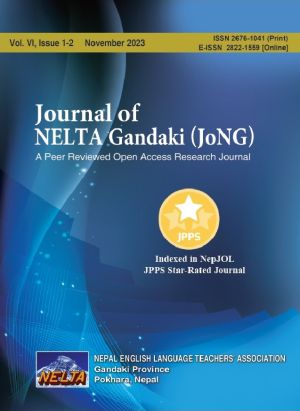Extensive Reading at the University Level: Why is it Trivialized in Practice?
DOI:
https://doi.org/10.3126/jong.v6i1-2.59705Keywords:
Extensive reading, intensive reading, trivialization, reading instructionAbstract
The role of extensive reading in the formation of students' life-long reading habits and their overall academic achievement has been well established in ESL/EFL scholarship. Despite this, studies reveal that extensive reading is being either trivialized or ignored in reading instruction. In this regard, the current paper aims to explore the factors responsible for the trivialization of extensive reading in university reading instruction. To this end, the study adopted a single case study design that comprised four university ESL/EFL teachers and eight students as participants. The data were collected through three qualitative methods: non-participatory semi-structured classroom observation, semi-structured interviews, and focus group discussion. The analysis of the data revealed four major factors preventing university students from reading widely and extensively: students' poor reading habits, students' increased use of social media, teachers' lack of extensive reading and failure to motivate students, and an unsupportive institutional environment. The findings imply that extensive reading cannot be promoted unless it is integrated into every day reading lessons and practised under the guidance of teachers in a resourceful environment.
Downloads
Downloads
Published
How to Cite
Issue
Section
License
Copyright (c) 2023 Nepal English Language Teachers' Association Gandaki Province

This work is licensed under a Creative Commons Attribution-NonCommercial 4.0 International License.
This license allows reusers to distribute, remix, adapt, and build upon the material in any medium or format for noncommercial purposes only, and only so long as attribution is given to the creator.




